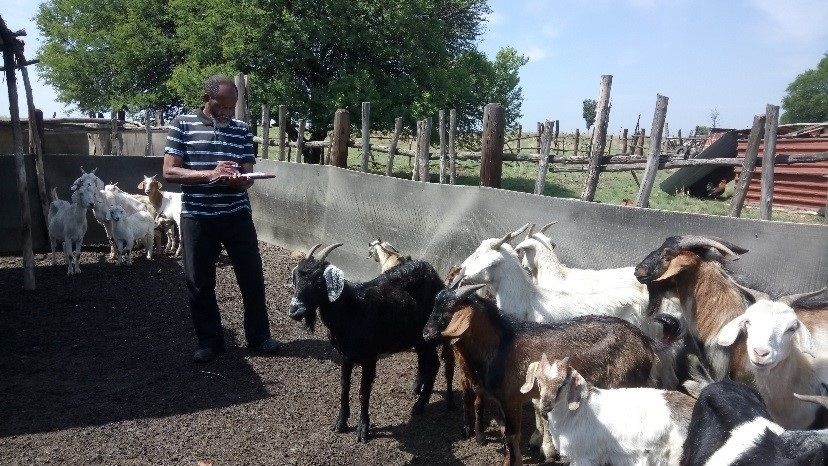As small farmers in South Africa own 40% of the country's livestock, they can make a massive contribution towards rural income and food security by becoming more productive. By empowering them through relevant programmes, they could adopt a commercial mindset which can unlock a powerhouse of rural development, food security and individual wealth creation.
"My herd looks different now from what it did before the training. Before I didn’t know how to manage my cattle. Now, with daily observations, it is easy to identify the ones that suffer from something and to start treating the problem." Sharing his experiences is Mr Dube, one of the small-scale farmers in the Dannhauser district who is benefitting from Afrivet Training Services’ involvement in the Exxaro Durnacol Livestock Improvement Project.
Afrivet Training Services was started with the aim of uplifting smallholders’ technical ability and providing access to technical support. A driver for its creation was a Dohne Research Station study into communal farmers’ poor productivity that found that a lack of management and technical abilities were among the most important reasons. "As small farmers own 40% of the country’s livestock, they can make a massive contribution towards rural income and food security by becoming more productive," says Dr Alfred Kgasi from Afrivet Training Services. "Our aim is to improve the quality and productivity of livestock."
If the productivity of communal livestock farming can be improved through better herd, grazing and disease management, annual weaner production can increase by 147%.Livestock research fact pack: Bureau for Food and Agricultural Policy
When Exxaro first invited Afrivet to get involved in its community development programme in Durnacol in 2016, the condition of the herds varied from good to very poor. The farmers relied on free medicine from the local state veterinarian’s office, but due to budget cuts and issues with logistics, remedies were not always available when they were needed.
The biggest issue, however, was that the farmers had not been trained and coached to become independent and to run successful stock farming businesses. "In most cases, the poor state of the animals could have been avoided by simply following the good management practices that are supposed to be carried out daily by the person responsible for the animals," says Kgasi.
In hindsight, Dube agrees: "Our cattle used to graze anywhere, anyhow. Now we know that we need to move them to different areas so that the grass can grow again. We also know how important it is to give supplements in winter when the grass cannot give the animals all the energy they need."
The farmers took the Afrivet training to heart – and into the fields – and today success is evident everywhere. Calf mortality rates have decreased by almost 50%, and all the farmers have been registered as livestock owners under the Animal Identification Act. As such, they now have their own registered brand marks with which to mark their animals, resulting in a dramatic reduction in theft.
Training farmers
The trained farmers have taken on the role of community animal production advisors, helping neighbours and friends to solve animal disease problems. At three farmer information days organised by Afrivet, the farmers had a formal opportunity to share their newly acquired knowledge with their peers.
The training has also had infrastructural spinoffs. Following a training session on how to build a proper crush pen, the farmers built their own crush, which is now being used by the community to manage, examine and treat their animals.
Arguably the biggest and most sustainable benefit of the training has been that it opened farmers’ eyes to the opportunities that commercialisation holds, and to the business value of farming. "Small farmers currently lose at least R10bn per year (at farm gate prices) in lost cattle production alone," says Matthew Carter, managing director of Afrivet Training Services. "It is an ongoing opportunity cost to the poorest of the poor, given the land and animals they have. Proper training can change the picture dramatically."
"They taught us about production," says Dube. "How to manage the kraal so that you can sell animals to buy more animals, as well as feed and medicine. That was something I didn’t do before."
For some farmers this meant diversifying their livestock farming to include, for instance, chicken production; others dipped their toes into the unfamiliar water of livestock auctions. "None of these farmers were selling their animals at auctions like the commercial farmers do," says Kgasi. "In fact, they had never even been to an auction."
The Afrivet team took their trainees to an auction to observe and learn – and ask questions. "Why so much money for such small animals?" "Why so little money for the big cow?" Following the field trip, a formal training session on auctions – from animal identification (as required by law) to getting your cheque after the sale – answered all the questions.
At the Dundee BKB auction held on 5 April this year, six Durnacol farmers made sales with a combined value of R58,300. "We can look after our cattle now," says Dube. The two cows he sold at the Dundee auction earned him more than R15,000.
This is hopefully the start of bigger and more successful stock farming for Dube and his colleagues.




























